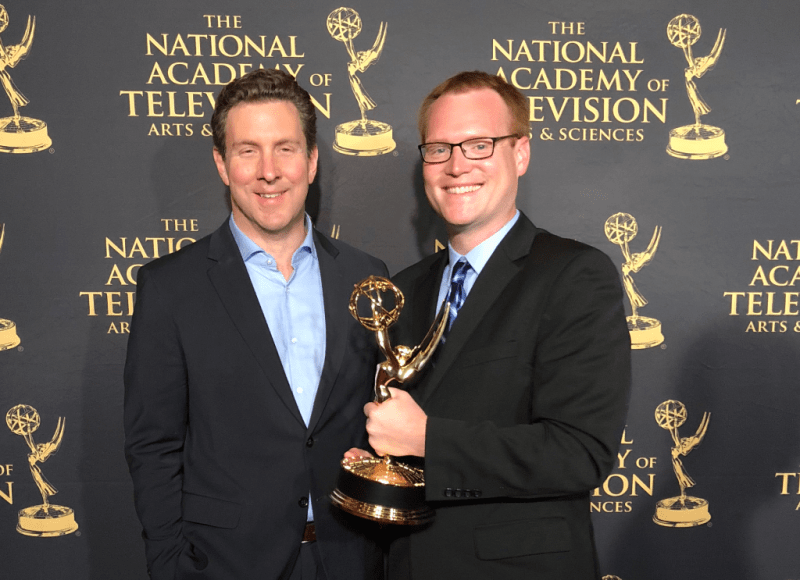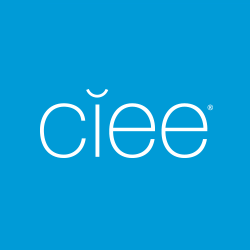CIEE Study Abroad Alum Wins Emmy Award for PBS Series “The End of AIDS?”
CIEE Cape Town alum Jason Kane won an Emmy Award in October 2017 for his work on the "The End of AIDS?," a six-part PBS NewsHour series on worldwide efforts to break the back of the global HIV/AIDS epidemic, produced in collaboration with “Science” magazine and the Pulitzer Center on Crisis Reporting. The Emmy Awards is an American award, presented by the National Academy of Television Arts & Sciences, which recognizes excellence in various sectors of the American television industry. “The End of AIDS?” received the 38th annual Emmy for Outstanding Science, Medical, and Environmental Reporting. It was a monumental win for Jason, who was inspired to pursue health journalism when he worked with children impacted by HIV during his study abroad semester with CIEE.
The experience moved Jason into action and sparked a greater interest in researching HIV/AIDS, especially after becoming so close with a little boy at the orphanage whose life was deeply affected by the virus. He wrote for Religion News Service while abroad – a news agency covering religion, spirituality, culture, and ethics, whose wire reports are distributed to more than 170 media outlets. Those few contributions to the international press pool inspired Jason to continue searching for the under-told stories, fueled by the experience and relationships that were facilitated by CIEE.In 2006, Jason embarked on a journey to Cape Town, South Africa while pursuing a journalism degree at George Washington University. Like many CIEE students in Cape Town, Jason volunteered in local communities. He traveled to the nearby township of Khayelitsha every week to volunteer at Baphumelele, a children’s home providing shelter and support for vulnerable and orphaned children with chronic diseases and HIV/AIDS. Jason says of the experience, “The kids of Baphumelele and their caregivers quickly became my real teachers that semester in Cape Town. In the face of incredible hardship, they enjoyed every second of life and made the most of it with laughter, love, grit, and resilience. As a volunteer who popped in from time to time, I knew I wasn't doing much more than providing a few hours of entertainment for the kids each week (though just the sight of my bright red hair always gave them a special thrill). I also knew the time I spent with them was having a profound impact on me, and that my own life was now headed in a new direction.”
“When I returned home after that semester, I couldn't shake the memory of the little boy I met at Baphumelele who became my friend. I couldn't forget his smile and extremely uncertain future. It bothered me that I wasn't able to do more for him from afar, so I started looking for opportunities to have an impact in my local community."
Taking his life-changing experience home, Jason leveraged his knowledge about the epidemic to make a difference in Washington, D.C., another city struggling with high HIV rates. After graduation, he spent a year teaching an HIV/AIDS prevention curriculum to public schools in D.C. through City Year, a branch of AmeriCorps. Jason dedicated that year of service to the children of Baphumelele.
Since 2011, health care has become the primary focus of Jason’s journalistic work, covering topics such as the Affordable Care Act, drug addiction in the slums of Tanzania and the small towns of Appalachia, malnutrition and health disparities in Guatemala, and advances against HIV in some of the hardest-hit corners of Sub-Saharan Africa. “At NPR, Religion News Service, The Winchester Star, and, most recently, PBS NewsHour, I’ve attempted to shine a spotlight on efforts to combat HIV, as well as the governmental policies that often impact its spread far more than any other factor,” said Jason. That coverage has included profiles of sex workers in Tanzania, fishermen in Kenya, heterosexual couples in Russia, injection drug users in rural Indiana, and gay men in the suburbs of Atlanta.
With HIV falling away from headlines somewhat in recent years, Jason is proud to be one of the journalists still focusing aggressively on this epidemic, which effects approximately 36.7 million people worldwide. Because of his personal experiences, Jason is inspired to break away from the journalistic pack in D.C. to find more untold stories to bring to a wide audience. As a PBS NewsHour producer, he exercises this type of journalism, educating viewers on health issues from a unique perspective.
Jason’s success in international storytelling reached great heights in July 2017 when he learned that “The End of AIDS?” series was nominated for an Emmy. “Our series aired at a time when political campaigns, rising global tensions, and mass violence had dominated nearly every minute of the news cycle. The nomination itself felt like such a vindication because this particular series took an in-depth look at something radically different – six places around the world drafting plans to end their AIDS epidemics.” When competing with much flashier stories of the time, Jason and his team didn’t think “The End of AIDS?” had a chance at winning.
Much to their surprise, “The End of AIDS?” was awarded the Emmy for Outstanding Science, Medical, and Environmental Reporting on October 5, 2017. William Brangham, the correspondent for the series, presented powerful words on behalf of the team as they received their award, “At a time when there are people trying to sow distrust in the media and what we all do, there were researchers and scientists and people living with HIV all over the world who trusted us to tell their story. We are hugely grateful to them, and this is for them.”
It was a big win for the HIV/AIDS community and for Jason. He says of the experience, “I’m so proud of the winged, golden statue that now sits on my shelf at home. But I’m even more proud that the Emmy has meant that far more people watched our series. This past World AIDS Day, standing room-only crowds gathered in several colleges around the country to watch 'The Emmy-Award Winning Series, The End of AIDS?’ Scientists and researchers continue to share our reporting as an example of important journalism. Regular viewers continue to tell us how much they’ve learned. As a journalist, it doesn’t get much better than that.”
While celebrating his major career milestone, Jason reflects on where his interest in HIV/AIDS research all began – on his CIEE Study Abroad program in South Africa. “Studying abroad in Cape Town was the single best decision of my life. Something about living so far from home, in such a vibrant and distinct place, made learning new things feel more exciting, impressions deeper, relationships richer. Cape Town is where I met my future wife and a tight-knit group of friends that have become our family. No matter where else I go in the world, I’m certain I’ll never see a city more beautiful, complex, and inspiring than Cape Town. So much of that experience can be credited to Quinton Redcliffe and his CIEE team, who created opportunities for us to explore South African life far beyond campus, in its many forms and complexities. I will forever be in their debt.”
No matter how many years passed, Jason continued to think about Baphumelele and the little boy who left an indelible mark on his life. In 2016, during Jason’s last reporting trip to South Africa for “The End of AIDS?,” he stopped by the orphanage to ask about the boy. Jason was pleased to find that someone adopted him and he is doing quite well. As for “The End of AIDS?,” they will continue the educational series with new reports this spring from Russia, Nigeria, and Florida.

